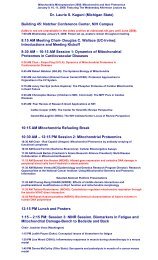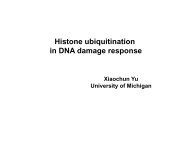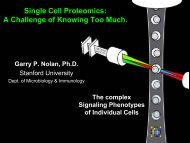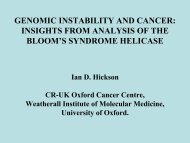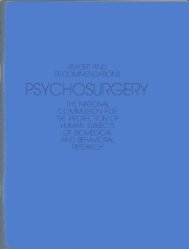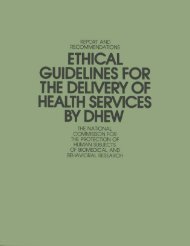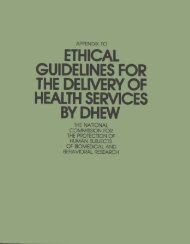RESEARCH ON THE FETUS - National Institutes of Health
RESEARCH ON THE FETUS - National Institutes of Health
RESEARCH ON THE FETUS - National Institutes of Health
Create successful ePaper yourself
Turn your PDF publications into a flip-book with our unique Google optimized e-Paper software.
directly involved in those cases. Granting the fullest intendment to those<br />
decisions possibly arguable, it seems to me that the woman's new-found constitutional<br />
right <strong>of</strong> privacy is fulfilled upon having the fetus aborted. If an infant<br />
survives the abortion, there is hardly an additional right <strong>of</strong> privacy to then<br />
have him or her killed or harmed in any way, including harm by experimentation<br />
impermissible under standard norms. At least Roe and Doe should not be assumed<br />
to recognize such a right. And while the Court's unfortunate language respecting<br />
"potential" and "meaningful" life is thought by some to imply a total abandonment<br />
<strong>of</strong> in utero life for all legal purposes, at least for the first two trimesters,<br />
such a conclusion would so starkly confront our social, legal, and moral traditions<br />
that I think we should not assume it. To the contrary we should assume<br />
that the language was limited by the abortion context in which used and was not<br />
intended to effect a departure from the limits on human experimentation universally<br />
recognized at least in principle.<br />
A shorthand way, developed during the Commission's deliberations, <strong>of</strong><br />
stating the principle that would adhere to recognized human experimentation norms<br />
and that should be recommended in place <strong>of</strong> Recommendation (5) is: No research<br />
should be permitted on a fetus-to-be-aborted that would not be permitted on one<br />
to go to term. This principle is essential if all <strong>of</strong> the unborn are to have the<br />
protection <strong>of</strong> recognized limits on human experimentation. Any lesser protection<br />
violates the autonomy and integrity <strong>of</strong> the fetus, and even a decision to have an<br />
abortion cannot justify ignoring this fact. There is not only the practical<br />
problem <strong>of</strong> a possible change <strong>of</strong> mind by the pregnant woman. For me, the chief<br />
vice <strong>of</strong> Recommendation (5) is that it permits an escape hatch from human experimentation<br />
principles merely by decision <strong>of</strong> a national ethical review body. No<br />
principled basis for an exception has been, nor in my judgment can be, formulated.<br />
The argument that the fetus-to-be-aborted "will die anyway" proves too much. All<br />
<strong>of</strong> us "will die anyway." A woman's decision to have an abortion, however protected<br />
by Roe and Doe in the interests <strong>of</strong> her privacy or freedom <strong>of</strong> her own body,<br />
does not change the nature or quality <strong>of</strong> fetal life.<br />
Recommendation (6) concerns what is now called the "nonviable fetus<br />
ex utero " but which up to now has been known by the law, and I think by society<br />
generally, as an infant, however premature. This Recommendation is unacceptable<br />
to me because, on approval <strong>of</strong> a national review body, it makes certain infants<br />
79



